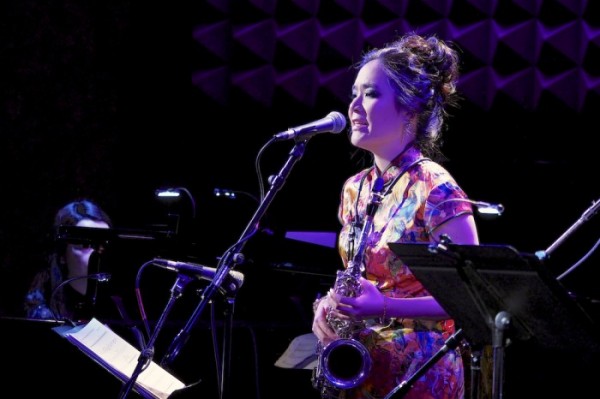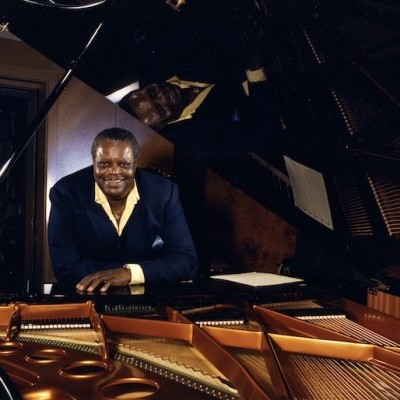Dec 9, 2025 12:28 PM
In Memoriam: Gordon Goodwin, 1954–2025
Gordon Goodwin, an award-winning saxophonist, pianist, bandleader, composer and arranger, died Dec. 8 in Los Angeles.…

Stephanie Chou performs March 29 at Joe’s Pub in New York.
(Photo: Michael Yu)Even though she excelled as a math major at Columbia University, Stephanie Chou had already looked ahead to a saxophone career, having played the alto and soprano since she was 10. The native New Yorker first studied the Western classical saxophone canon and then expanded her knowledge by exploring the city’s competitive improvisational circles. But Chou found her voice as a saxophonist and vocalist when she embarked on a journey into the rich folkloric music of her Chinese heritage. She began composing and arranging ebullient songs that fused jazz and classical with Chinese folk and pop harmonies and rhythms.
At the release party last year for her splendid sophomore album, Asymptote (DouMiao-Haricot), at Lincoln Center’s David Rubenstein Atrium, Chou sang in English and Mandarin while easing into her emotive alto lines. She led her quartet into a cooking gambol through the traditional tune “General’s Command,” the calming “Quiet Night Thought” (based on an ancient poem by Li Po) and her playful, speeding tongue-twister original “Eating Grapes.” At the end of the set, Chou introduced a new piece, “Manchurian Girl,” based on a 1938 Japanese hit pop tune that was also released in China. The song was a part of a preview of a larger work Chou was working on based on the inhumane, degrading treatment of Chinese “comfort women,” who were enslaved for sexual pleasure by Japanese soldiers in World War II.
Thanks in part to a commission from the American Composers Forum, Chou composed the score and arranged the music for her first long-form suite. She premiered the 90-minute Comfort Girl on March 29 at Joe’s Pub at the Public Theater in New York with a five-piece ensemble that included vocalist Orville Mendoza, pianist Kelly Lin, drummer Kenny Wollesen and Andy Lin on erhu, viola and violin—plus narrator Peregrine Heard. It is a stunning work that not only shines light on a dark chapter of history but also feels inspirational for contemporary listeners. (Chou plans to release the full album by the end of this year.)
The historical background for the Comfort Girl story largely has been hidden, Chou explained before her sold-out Joe’s Pub show. “I only learned about it six years ago,” she said. “My younger sister, who was taking an East Asian Studies class in college, told me about it. I started reading history books about this horrifying experience that was covered up. I applied for the composers grant then began to work on making a musical treatment of this heartbreaking time—when a lot of families shunned them and the government accused them of treason.”
Chou said that about 400,000 women were abducted by the Japanese army controlling China beginning in 1938. Some tried to escape but were caught and beaten or killed. Some were killed in camps. Others were released at the end of the war, but some were not accepted by their families and friends when they returned home. “I didn’t want this piece to be all depressing or overly dramatic,” Chou said. “I wanted to tell a story to get a message out there.”
During the premiere of Comfort Girl, Chou and her band told the story of a young woman who is excited about her upcoming marriage to a boyhood friend, but then she is kidnapped by soldiers during the wedding ceremony. The happier moments of the tale explore young love (as conveyed in the joyful “Forever I Will Sing Your Song”) and feature the lush, harmonic intertwining of alto saxophone and violin and then later, erhu accompaniment. At the wedding celebration, the music turns from joyful celebration to horrific clash with Wollesen’s thunderous drums and Chou’s shouting vocals painting an image of the terror.
The story unfolds in segments, like short chapters, with anguished vocals, saxophone spirals and angry rhythms. At the young woman’s first encounter in camp, the music turns tumultuous, with saxophone and piano laments and Chou screaming, “Now, my world is shattered.” Avant-garde jazz chronicles the fracturing of life, and melodic islands of beauty are interspersed, including a long piano solo by Lin that captures the anticipation of escape. At one point, the band renders the sweet “Jasmine Flower,” a tune the two lovers used to sing together.
The most powerful piece was the jazz-fueled song of escape that Chou sang with a confident urgency toward the abductors: “I’m fighting back, and I’m stronger than you. … I won’t be silent anymore.” When the woman escapes and finds her way back home, she sees her fiancé in the fields, and is left with the poignant question: “Who’s the person left in there?” The Comfort Girl suite, thought-provoking throughout, ends with that question—one that has echoed through the decades. DB

Goodwin was one of the most acclaimed, successful and influential jazz musicians of his generation.
Dec 9, 2025 12:28 PM
Gordon Goodwin, an award-winning saxophonist, pianist, bandleader, composer and arranger, died Dec. 8 in Los Angeles.…

Belá Fleck during an interview with Fredrika Whitfield on CNN.
Jan 13, 2026 2:09 PM
The fallout from the renaming of the John F. Kennedy Center for the Performing Arts to include President Donald…

Flea has returned to his first instrument — the trumpet — and assembled a dream band of jazz musicians to record a new album.
Dec 2, 2025 2:01 AM
After a nearly five-decade career as one of his generation’s defining rock bassists, Flea has returned to his first…

Dec 11, 2025 11:00 AM
DownBeat presents a complete list of the 4-, 4½- and 5-star albums from 2025 in one convenient package. It’s a great…

“It’s a pleasure and an honor to interpret the music of Oscar Peterson in his native city,” said Jim Doxas in regard to celebrating the Canadian legend. “He traveled the world, but never forgot Montreal.”
Nov 18, 2025 12:16 PM
In the pantheon of jazz luminaries, few shine as brightly, or swing as hard, as Oscar Peterson. A century ago, a…